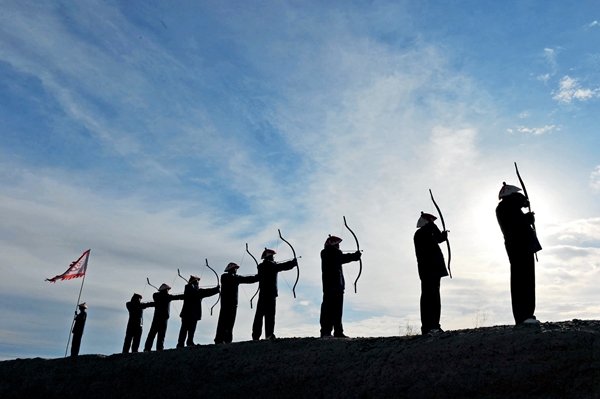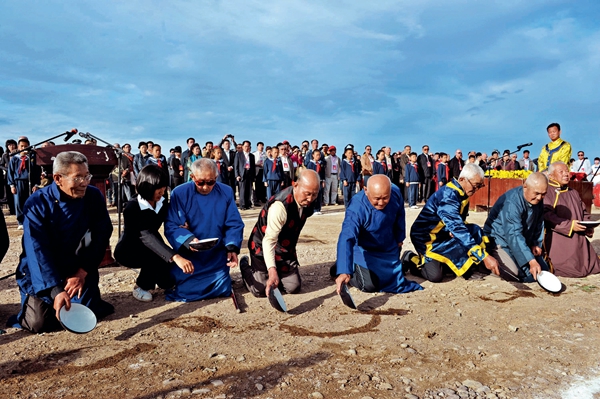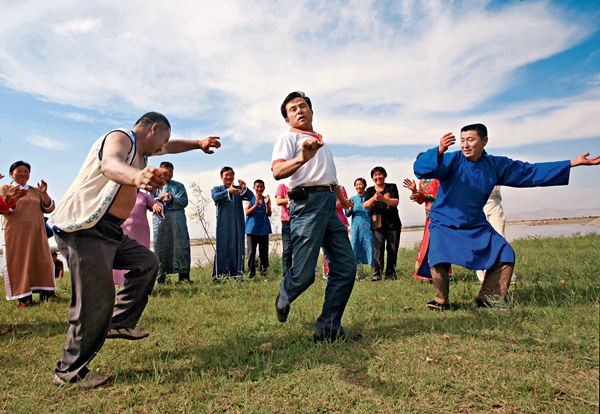Xibe Festival Gives Nod to Frontier Soldiers
THE Xibe ethnic minority has long been established in China. Its people now mostly reside in northern provinces like Liaoning, Jilin, and Xinjiang. It was one of the first northern ethnic groups to take up farming, and has its own written language.
On the 18th day of the fourth lunar month Xibe people across the country traditionally gather at Taiping Temple in Shenyang City, Liaoning Province, to pay tribute to their ancestors. Those who cannot make the journey for whatever reason (like those who live 4,000 km away in Xinjiang and find it difficult to travel) celebrate the day, known as the West Migration Festival, with picnics, singing, and dancing.

This festival has been held every year for the last 253 years, and in 2006 it was added to the list of China’s national intangible cultural heritage.
Migration in the Qing Dynasty
Originally, Xibe people lived on the Songhuajiang-Nenjiang Plain and Hulunbuir Grassland in northeastern China. After suppressing the Zungar revolt in the northwest in 1764, the Qing government sent 1,018 Xibe soldiers from Shengjing (now Shenyang) and other places, together with their families, to Ili in Xinjiang with orders to exploit the land and secure the border there.
Before these people, numbering 3,275 in total, made the long journey westward, they gathered with their fellow tribesman at Taiping Temple (the Xibe ancestral shrine) to eat and pray together and bid each other farewell. This was on the 18th day of the fourth lunar month. The next morning, these solders and their families set off on the long, perilous migration trail.
It has since become an annual tradition for the Xibes to slaughter pigs and cook sorghum for an extravagant feast at the temple on this day, commemorating this difficult journey, thinking their brothers and sisters who live away from their ancestral lands, as well as remembering the huge sacrifices they made to defend the country’s borders. For this reason the West Migration Festival is also known as the Kinsman Festival.

In Xinjiang the new arrivals were stationed at 18 posts along the Ili River, and set up three-meter-high earthen defenses. They also regularly rotated between garrisons in neighboring Tacheng and Kashgar. In addition to the military exercises, these Xibe soldiers developed desert areas and built irrigation channels using water from the Ili River. Gradually the region where they were stationed (today known as Qapqal Xibe Autonomous County) became the most developed in Ili. More than 30,000 of their descendants still live there today.
A Punishing Journey
According to historical records, the route taken by the Xibe soldiers from Shenyang to Ili went via Mongolia. The 5,000 km journey covered the huge obstacles of the Greater Khingan Mountains, Mongolian prairie, Altay Mountains, Junggar Basin, and Tianshan Mountain. Since their only means of transport were horses and ox-drawn wagons, the Xibes had to take the route which would be sure to provide plenty of water and grass for their animals.
By the time they had reached Uliastay in Mongolia it was already October and the temperature on the grasslands had plummeted. An early winter storm afflicted many in the group with frostbite. To make matters worse, disease broke out amongst the animals, which were already worn out after the long journey, and many of them starved to death in the cold. Only 400 of the 3,000 cattle which the Xibes had brought from Shengjing survived and 300 of the 2,000 horses were too emaciated to travel, which made it impossible for the Xibes to move on. They decided to wait until the winter was over.
The travellers spent seven months in Uliastay. When the grass turned green the following spring, they resumed the journey with 500 horses and 500 camels they had borrowed from local tribes.

When they came to Khobdo (on the present day border between China, Russia, Mongolia and Kazakhstan) snow melt from the Altay Mountains flooded the road, trapping the troops for two months. Their food supply soon ran so low that they were forced to gather whatever edible materials they could find, even tree bark.
The migration to the west was fraught with hazards and hardships. Under the strain of constant fatigue, hunger and cold, most pregnant women in the group went into early labor. Due to a shortage of cloth, they wrapped their newborn babies in grass. Despite all this, the Xibes were indomitable and resilient. No women or children were left behind on the way. When the travellers arrived in Ili in August 1765 they were carrying 350 babies born during the journey, who would follow in their fathers’ footsteps to guard the nation’s borders.
A 200-year-old Tradition
For over two centuries Xibe people have celebrated the 18th day of the fourth lunar month with various activities, such as picnics, archery, martial arts contests, singing and dancing. A focal event is a performance of the epic poem Song of the West Migration, which is over 500 lines long and sung in several different languages, including Han, Manchu, and Xibe.
On this day, both male and female, young and old, put on traditional costumes to sing and dance to ethnic music played on the Dongbur, a traditional musical instrument.
Xibe people are good archers, and archery is one of the most highly anticipated events at the West Migration Festival. In fact, Qapqal is the cradle of archery in China.
These celebratory events have rich cultural and historical significance for Xibe people, showcasing and preserving their traditions, customs, arts, sentiments, and beliefs.
(Compiled by China Today)
Services
Economy
- Chinese Manufacturing Sector Rides Fourth Industrial Revolution Wave
- China, Sri Lanka Strengthen Cooperation on Maritime Silk Road Interview with Sri Lankan Ambassador to China Karunasena Kodituwakku
- The Challenge of Understanding China and Its Future
- Promoting Further Development through Communication and Cooperation
- The Belt and Road Augurs a Community of Shared Destiny
